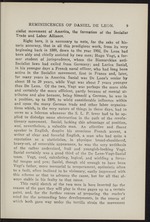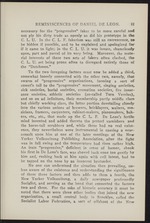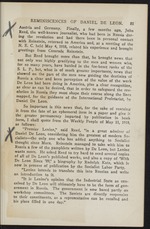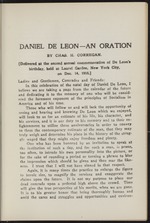| 1 |
 |
“...REMINISCENCES OF DANIEL DE LEON. 9
cialist movement of America, the formation of the Socialist
Trade and Labor Alliance.
Right here, it is necessary to note, for the sake of his-
toric accuracy, that in all this prodigious work, from its very
beginning back in 1889, down to the year 1902, De Leon had
been ably and chiefly assisted by two men; Hugo Vogt, a for-
mer student of jurisprudence, whom the Bismarckian anti-
Socialist laws had exiled from Germany; and Lucicn Sanial,
in his younger days a French naval officer, who had long been
active in the Socialist movement, first in France and, later,
for many years in America. Sanial was De Leons senior by
about 18 to 20 years, while Vogt was about 7 years younger
than De Leon. Of the two, Vogt was perhaps the more able
and certainly the more efficient, partly because of mental at-
tributes and also because, being himself a German, he was in
a position, up to 1899, to wield considerable influence within
and upon the many German trade and other...”
|
|
| 2 |
 |
“...humor, shook
his first in De Leons face, was shoved back none too gently by
him and, rushing back at him again with evil intent, had to
be tapped on the nose by an innocent bystander.
No one can understand the situation then prevailing, un-
less aware of the existence and understanding the significance
of these three factors and then adds to them a fourth, the
New Yorker Volkszeitung, a daily newspaper professedly
Socialist, and serving as the bond that connected the factors
two and three. For the sake of historic accuracy it must Ie
noted that there were three other bodies that joined the nev*-
organization, a small central body in Brooklyn, called the
Socialist Labor Federation, a sort of offshoot of the Neer...”
|
|
| 3 |
 |
“...years, have battled in the foe-beset ranks of the
L. P, but what IS of much greater importance, news that
showed on the part of the men now guiding the destinies oj
Russia a clear and keen perception of the value of the work
De Leon had been doing m America, plus a clear recognition
oLrioT-^V"- safeguard the rev-
olution m Russia they must shape their course along the lines
mapped, for the guidance of the International Proletariat by
Daniel De Leon. * ^
So important is this news that, for the sake of rescuing
It from the fate of an ephemeral item in a paper and give it
the greater permanency imparted by publication in book
IrTollows^ ' Weekly People of May 11, 1918,
Premier Lenine," said Reed, "i* a great admirer of
Daniel De Leon, considering him the greatest of modern So-
"i/ one who has added anything to Socialist
thought since Marx. Reinstein managed to take with him to
Russia a few of the pamphlets written by De Leon, but Lenine
wants more. He asked Reed to try hard to send several...”
|
|
| 4 |
 |
“...time that old Lucien Sanial was persuaded
by Vogt and Eberle to join the logical centrists. Sanial sent
a letter of resignation from the S. L. P. to the National Execu-
tive Committee. The sending of a resignation from the party
to any other body than the Section of which Sanial was a mem-
ber betrayed the mans knowledge of facts relating to party
organization and its laws and regulations. The National Exec-
utive Committee notified Sanial of his mistake, but wishing to
save Sanial for his own sake, offered to send a committee to
Northport, L. I., where he lived, to have the whole situation in
the party gone over thoroughly.
Sanials Avoidance of an Understanding
De Leon, who at that time was wdth his family at Milford,
Conn., wrote that he too would like to meet Sanial; in fact,
De Leon suggested that Sanial should be the judge in the case.
De Leon closed his letter by saying, If Sanial finds that I am
in the way of harmony in the party, I am willing to migrate
to Kokomo. Sanial replied...”
|
|
| 5 |
 |
“...Workers of the World, which instead
of running away from the class struggle bases itself squarely
upon it, and boldly and correctly sets out the Socialist prin-
ciple that the working class and the employing class have
nothing in common and that the working class must come to-
gether on the political as well as on the industrial field, to take
and hold that which they produce by their labor.
S. P. Actions Contrary to Words
In several other states besides New Jersey the Socialist
Party, for the sake of expediency, feigned attempts at unity
with the Socialist Labor Party. All these ended as the New
Jersey Unity Conference had ended. The Socialist Partyites
agreed on all occasions with the Socialist Labor Party men in
regard to principles and tactics; they agreed that industrial un-
ionism was requisite to the Socialist movement and the reali-
zation of Socialism; that the Industrial Union was the Social-
ist Republic in embryo. They agreed also on other vital ques-
tions, such as party ownership...”
|
|
| 6 |
 |
“...character, and
his services, and it is our duty to his memory and to their en-
lightenment to utilize these anniversaries in order to convey
to them the contemporary estimate of the man, that they may
truly weigh and determine his place in the history of the strug-
gle waged that they might enjoy freedom and plenty.
One who has been honored by an invitation to speak at
the institution of such a day, and for such a man, ij prone,
too often, to intrude his own personality into the picture, or
for the sake of rounding a period or turning a phrase to blur
the impression which should be given and thus mar the like-
ness. I trust that I will not have sinned in that respect.
Again, it is many times the practice to enlarge the figure
to heroic size, to magnify the services and exaggerate the
claims upon the future. It is not my purpose to place our
dead comrade upon a pedestal high above the crowd. Time
will give the true perspective of his merits, when we are gone.
It is to his greater honor that being...”
|
|
